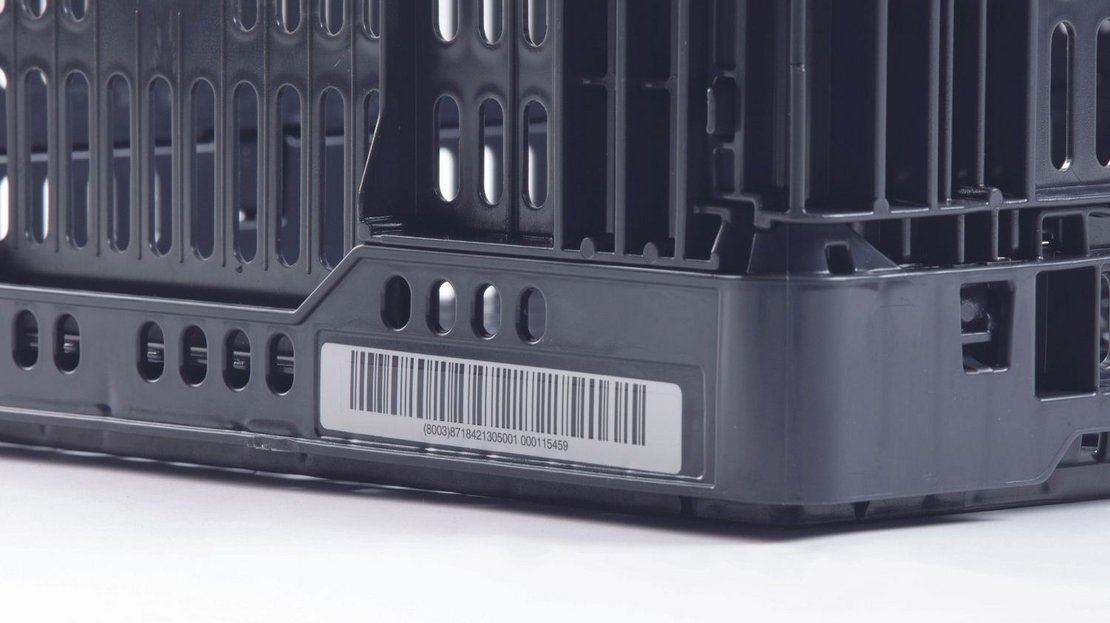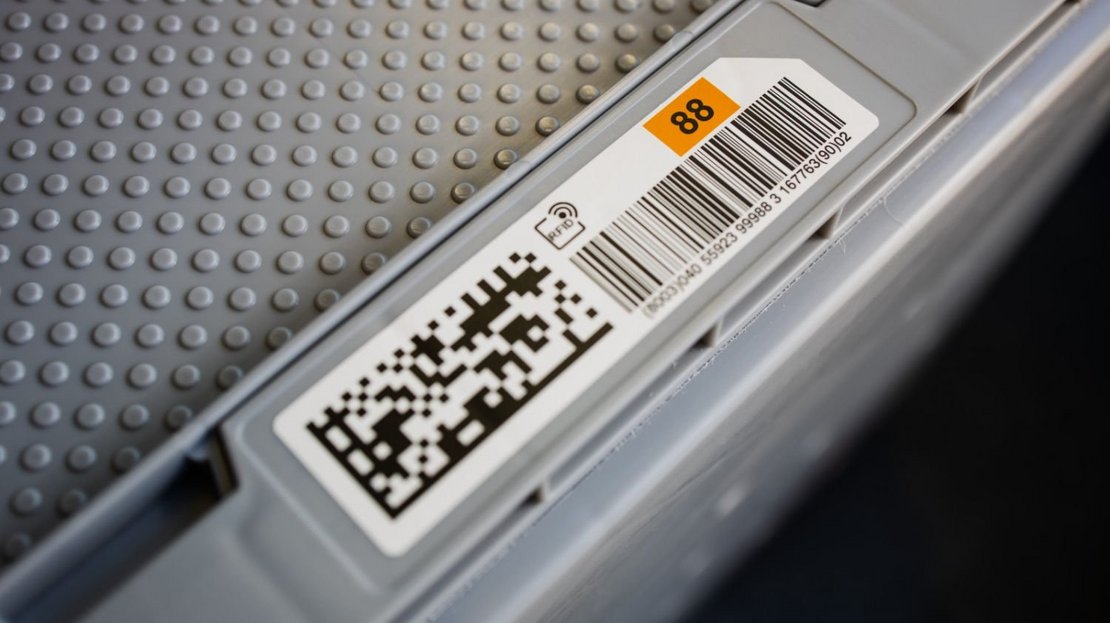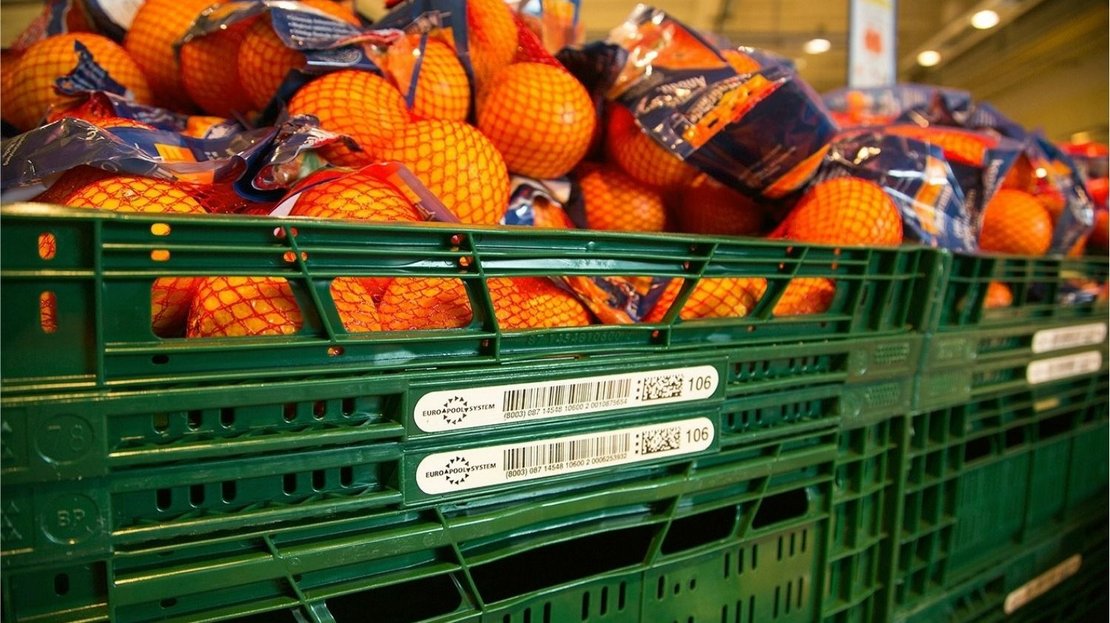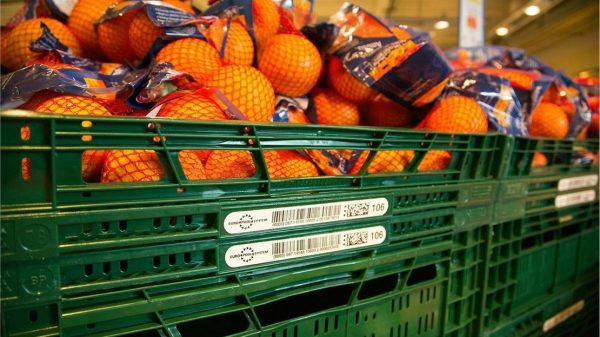When it comes to finding the best solution for labelling plastic containers or totes, there are numerous options available. Choosing the right solution is crucial to meeting specific needs and gaining optimum cost, time and sustainability advantages. We look at the various labelling options for plastic containers and totes, and the key benefits they provide.
Different types of labelling solutions
Two of the most prominent labelling solutions for plastic containers are adhesive and in-mould labels. Adhesive labelling provides high flexibility thanks to its use with a wide range of packaging materials. During the packaging process, adhesive labels are placed on the surface of a container.
To prevent damage and read data clearly, adhesive labels are often scratch and wash resistant, durable in varying weather conditions, and resilient to chemicals and UV light. They are also highly customisable with colour and logo options available.
In-mould labels, also known as IML, are incorporated within the design of a container or tote while it is being manufactured. Labelling therefore becomes an integral part of the container, completed in one step. The in-mould labelling process is accurate no matter what the shape of the container, and provides a high-quality, durable and sustainable solution.

There are several techniques used for IML, including blow moulding and thermoforming technologies. The most popular, injection moulding, referred to as IML-IM, has enabled more efficient labelling processes in recent times.
RFID and barcode in-mould labels
RFID and barcoding are the two key Automatic Identification (Auto ID) technologies used for inventory and asset tracking. Barcode reading uses light beams to read the patterned bars on a label, with each tag visible to the barcode scanner (referred to as line-of-sight) to capture the data.
RFID technology (Radio Frequency Identification) uses radio waves to communicate data from chips to RFID readers/scanners and does not require line-of-sight for label readings. Each technology brings its own benefits, and combined with in-mould’s durability, accuracy and sustainability, both are options for highly proficient in-mould labelling tracking.
Injection moulding in-mould labels
Injection moulding in-mould labelling (IM – IML) is a popular method within the in-mould labelling process. Manufacturers position a pre-printed polypropene label (PP label) inside the mould used to make the plastic container.
The PP fuses with the label before it cures to take the shape of the mould. This provides a ‘no-label’, seamless aesthetic to the container’s design, making it both secure and robust. The label’s integration into the product gives clear data readings and also makes it more resistant to various environmental conditions.
Advantages of RFID in-mould labels from inotec

RFID in-mould labels bring together the advantages of both RFID Auto ID and in-mould labelling. As a combined labelling solution, it provides permanence, durability, speed and accurate tracking of containers. At inotec, we develop our own RFID in-mould label range, INO-TAG DIOBOND, compatible with various materials and produced with our class leading digital printers. The INO-TAG range and RFID technology together offer several advantages, including:
- Speed and accuracy with no line-of-sight scanning needed, and readable at distance (up to 15 metres)
- The ability to scan multiple tags simultaneously for faster readings
- The avoidance of duplicate scanning, saving time and labour
- The storage of more complex, encrypted data at greater volume
In-mould labelling – environmental benefits and sustainability
- As the container or tote and the label are made from the same material, full recycling of all materials is possible
- In-mould labelled containers and totes are damp-proof, scratch-proof and temperature resistant. They are also tear-proof and shrink-proof
- In-mould labelling’s one-step automated process results in shorter manufacturing lines, ultimately requiring less energy input
Top industries for in-mould labelling
-
Food
IML’s permanent and edgeless bond between the label and the container prevents label contamination which could present severe health risks as well as compliance issues. In addition, the heat resistance of in-mould labels makes them ideal for labelling frozen and refrigerated goods for the food industry. Because the labels can be made with multilayer barriers, they can also reduce the volume of oxygen that may enter a container, increasing the shelf life of baked goods.

From a marketing stance, food brands have greater scope to use different shapes and geometries for plastic containers to create more eye-catching displays. IML works well for labelling seasonal food products too thanks to the ease and speed at which labels can be altered. In addition, the food industry is subject to strict regulation from bodies such as the US Food and Drug Administration (FDA) where accurate and secure labelling and tracking are often vital in fulfilling compliance requirements.
-
Pharmaceutical
Again, the seamless bond between container and label equates to a much more secure label, free from possible contamination. The pharmaceutical industry is also subject to US FDA compliance alongside other government, regulatory and quality standards, all of which are becoming increasingly complex. As such, pharmaceutical companies can utilise the accuracy and speed of IML to ensure they can trace, monitor and acquire data from containers precisely.
Also, because IML can be coded and moulded inside packaging, containers have their own unique and permanent identity, making it impossible for counterfeit labels to be incorporated, further protecting intellectual property.
Your partner for in-mould solutions – inotec
The IML market is continuing to grow with many other sectors such as automotive and personal care adopting its use. At inotec, we use our specialist barcode and Auto ID expertise to manufacture, supply and install a variety of durable labels and identification solutions. Our 25 years’ technical experience, along with our in-house capabilities enable us to match you with the most successful and effective in-mould labelling solution.
If you would like to find out more about in-mould labelling, contact inotec UK on 01482 654466 or email info@inotec.co.uk for a consultation with the sales team.

